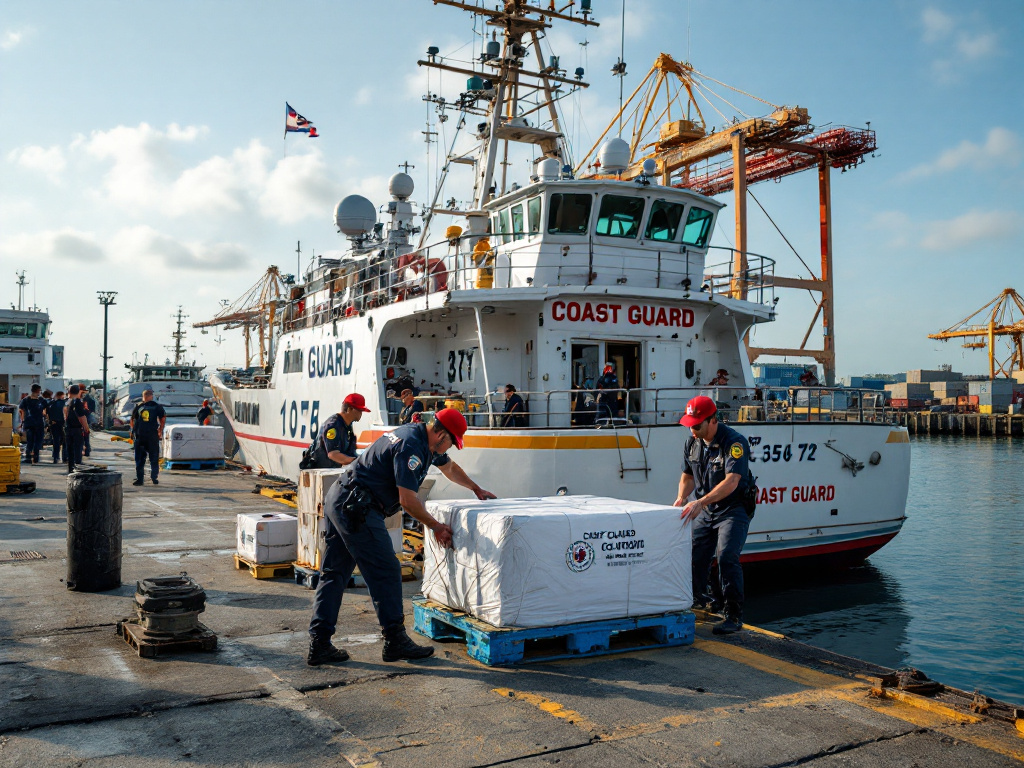Massive Interdiction at Sea Yields Huge Drug Haul
In a landmark operation highlighting continued efforts to diminish drug smuggling operations, the U.S. Coast Guard offloaded nearly 46,000 pounds of cocaine and marijuana, valued at approximately $517.5 million, at Port Everglades, Florida. The spectacular seizure, conducted primarily by the Coast Guard cutters Stone and Mohawk, took place over 14 separate interdictions in the eastern Pacific Ocean. This extensive maritime region is known historically as a critical route for cartels smuggling narcotics destined for the United States.
Homeland Security Secretary Kristi Noem appeared in Fort Lauderdale alongside Coast Guard leaders to underscore the significance of this achievement. She described the interception as “an unprecedented seizure of illicit drugs,” highlighting the wider strategic commitment of the administration to curb illegal activities across U.S. borders.
“Today is a historic day here at Port Everglades,” Secretary Noem stated emphatically, referencing the broader implications for drug trafficking trends and border security. “We own the sea, not you,” she asserted, directing her message firmly towards cartels attempting to use maritime routes for drug transportation.
Rear Adm. Joshua Lasky clarified the scale of the seized drugs, stating that the cocaine weighed approximately 20 metric tons, equating to an estimated 17 million doses.
Collaborative Efforts Strengthen Border Security
The success of the Coast Guard’s recent patrols at sea reflects broader strategic coordination involving multiple agencies and international partners, aimed at intercepting illegal narcotics and border security threats at points far offshore. Adm. Kevin Lunday, Acting Commandant of the U.S. Coast Guard, emphasized the importance of a collective response to maritime security, noting the interconnected responsibilities involving multiple U.S. departments and international organizations.
“Securing the maritime environment requires a layered and collaborative approach. This isn’t about any one agency—it’s a team effort,” Adm. Lunday detailed in his remarks. Indeed, these ongoing interdictions involved coordinated efforts from the Departments of Homeland Security, Justice, and Defense, alongside 22 international partners from Central America, South America, and Europe.
The significant scale of this operation also included crucial military support. Notably, the USS Gravely, an Arleigh Burke-class guided-missile destroyer, was deployed to assist in anti-drug trafficking operations—a clear display of increased military involvement in addressing the maritime drug trafficking crisis.
Over the duration of this deployment, around 35 suspected smugglers were apprehended, illustrating the ongoing challenges in combating extensive drug trafficking networks.
Broader Implications for Drug Trafficking and National Security
Underlining the importance of these continued victories at sea, the Coast Guard revealed that, since the commencement of expanded border security efforts under former President Donald Trump, it had seized more than 80,000 pounds of drugs. This ongoing crackdown represents a critical component of a broader policy aimed at strengthening national security through proactive border control measures and reducing internal drug availability.
The latest seizure also marks one of several significant busts in recent months, including a previous interception in which the Coast Guard confiscated over 12,000 kilograms (approximately 26,455 pounds) of cocaine at Miami Beach—valued over $141 million.
Secretary Noem, during her statements, also touched on the broader health and social implications of successful interdictions, emphasizing economic benefits and community safety: reductions in drug-related crimes, improvements in public health, and stabilizing local economies crippled by narcotics trafficking.
This recent success has not only disrupted cartel attempts to utilize popular marine routes but serves as a powerful demonstration of America’s continuing resolve to combat international drug smuggling operations aggressively. The interdiction further exemplifies the intensifying commitment from multiple levels of the U.S. government, law enforcement agencies, and military branches, supported by strong international alliances to secure not just America’s borders but safeguard international waterways from illicit drug trafficking.
Residents and stakeholders in South Florida particularly, accustomed to being located strategically at the nexus of several key maritime drug trafficking routes, have welcomed this decisive action, recognizing its implications for regional stability, public safety, and economic integrity.
With increasing desperation from drug cartels due to tightened land-based border security and sustained maritime patrols, observers predict that authorities will likely continue to witness boldened responses from traffickers, requiring ongoing vigilance and responsiveness from U.S. law enforcement and military authorities across all areas of border security.


